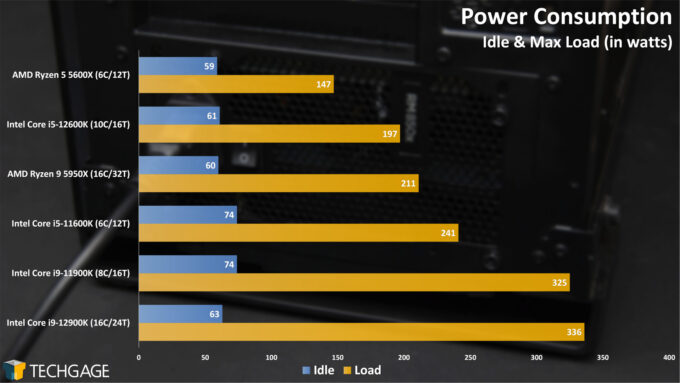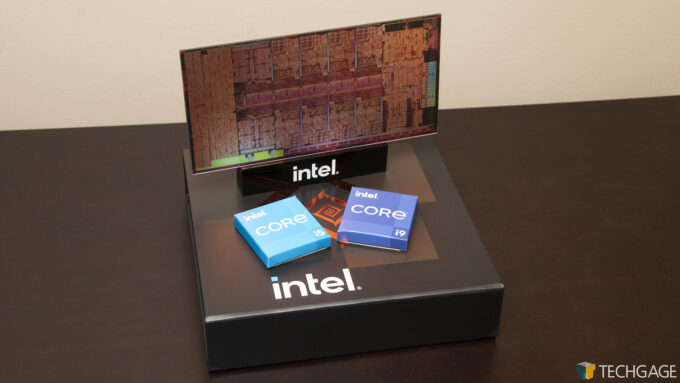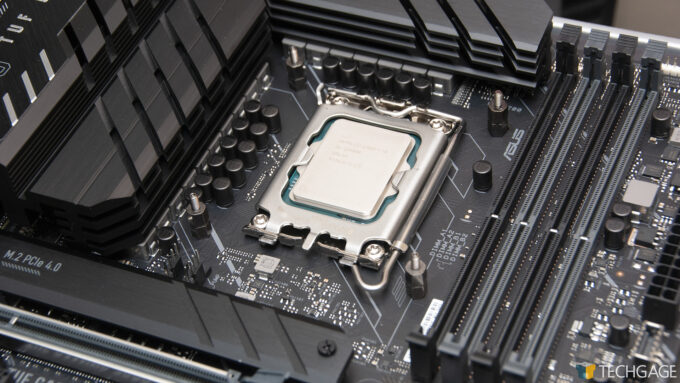- Qualcomm Launches Snapdragon 4 Gen 2 Mobile Platform
- AMD Launches Ryzen PRO 7000 Series Mobile & Desktop Platform
- Intel Launches Sleek Single-Slot Arc Pro A60 Workstation Graphics Card
- NVIDIA Announces Latest Ada Lovelace Additions: GeForce RTX 4060 Ti & RTX 4060
- Maxon Redshift With AMD Radeon GPU Rendering Support Now Available
Intel 12th-gen Core i9-12900K & i5-12600K Workstation Performance Review

Intel’s 12th-gen Core architecture represents a huge shift from previous designs, with ‘performance’ cores being teamed up with ‘efficient’ cores in launch models. For our first performance deep-dive, we’re going to put the i5-12600K and i9-12900K up against many encoding, rendering, and system benchmarks.
Page 8 – Power Consumption & Final Thoughts
Throughout all of our performance results, the overall impression is that Intel’s 12th-gen Core i9-12900K can either match or beat out AMD’s Ryzen 9 5950X more often than not. In the above power chart, we can begin to understand one thing that’s helping Intel: increased power usage.
Looking at the 12th- and 11th-gen parts first, we see that the 12900K uses only a bit more power than the 11900K, despite having eight additional cores. The 12600K result is a little more baffling, as it’s managing to use less power than the 11600K. We admittedly didn’t sanity check this one, since we would have had to reinstall the old motherboard and gear into the same chassis, but our testing procedure is so stringent, we believe we’d see the same thing if we did go through with sanity checking.
Nonetheless, gen-over-gen, Intel’s new chips seem to have decent power usage traits, but when you compare to AMD’s results, perceptions can really change. While the 12900K can regularly beat out the 5950X in many tests, it draws 125W more from the wall. The 12600K draws 50W more than the 5600X, but that almost seems modest in comparison!
Final Thoughts
Since Techgage launched over fifteen-years-ago, we’ve used and thoroughly benchmarked every Intel CPU generation to come along. After a while, things admittedly became a little boring, as we were simply not seeing the kind of gains from gen-to-gen that we were hoping to – and this all happened during a time when AMD’s chips weren’t wowing many people, either. Intel’s 12th-gen, aka Alder Lake, is downright exciting in comparison to other recent Intel Core launches.
When AMD first launched Zen, there was a lot to love. We finally saw the company deliver a product that deserved lots of attention. Vast improvements over previous generation AMD CPUs were made, and thankfully, the company iterated nicely on those improvements over time. When Zen 3 launched, AMD finally managed to catch up to Intel’s single-threaded performance, and it seemed like Intel would have a real mountain to climb in order to properly strike back.
Well, Intel’s recent troubles are no secret. The company seemed to get into a rut where CPU development was concerned, and some wondered if AMD’s sudden resurgence was too much to handle in a swift manner. Alder Lake proves that we really had little reason to ever doubt the company. As with the original Zen release, we see vast improvements with Alder Lake, with performance hikes that are likely higher than most people would have expected. That seems like a successful launch to us.
As hinted at earlier, we didn’t expect the Core i9-12900K to perform strongly enough to take on AMD’s Ryzen 9 5950X. After all, we’re talking about an 8+8 CPU design, vs. a native 16-core. Well, as it happens, Intel’s architectural gains combined with those new energy-efficient cores means the company doesn’t currently need the same number of “high-performance” cores as its competitor to deliver extremely competitive performance.
While we didn’t touch on gaming for this article, we’ve seen some results from around the web that show Intel again proves strong there, giving Intel some validation for when it calls the 12th-gen the best gaming CPU series. For our first look at performance, we wanted to focus squarely on workstation and creator use, but will tackle gaming once we get down to our DDR4 vs. DDR5 testing.
As is probably obvious by now, there’s a lot to like about Intel’s 12th-gen chips, but there are some caveats to bear in mind. As it stands today, DDR5 is horrifically hard to acquire, at least if you don’t want to pay exorbitant prices to scalpers. At this point in time, we’d suggest any creator looking at these 12th-gen CPUs to consider DDR4 instead.
From what we’ve seen, DDR4 vs. DDR5 performance isn’t so different that DDR4 should be ignored. You can currently get more DDR4 memory for less – at SRP, you could save at least $200 on a 64GB kit, but that actually assumes you could buy DDR5 in the first place. Launch DDR kits are always spec’d more modestly than later-gen kits, and are generally more expensive, so we’d expect that in the months and year ahead, we’ll see DDR5 kits create a bigger gap between it and DDR4.
We’d be remiss to talk power here, because as the results above have shown, Intel’s 12th-gen chips are not exactly modest when it comes to satiating their appetite for power. The 12900K did in fact beat out the 5950X in most of our tests, but it drew so much more power to attain it. In addition, because of all of that extra power use, a great CPU cooler will be needed for a chip like the 12900K. Think triple-rad AIO at least.
With this new platform, pricing is going to be a big consideration all over. The i9-12900K is priced at $589-599 USD by Intel, which is a bit of a hike over the i9-11900K, which was priced at $539-549 (all prices based on per 1,000 units, so you could expect to pay more at retail.)
In even more price talk, Intel Z690 motherboards are currently more expensive than last-gen boards overall, but you can still get some that look pretty decent for $250 and less. The cheapest Z690 board we could find so far was priced at $220 – MSI’s PRO Z690-A. If you want as feature-rich a motherboard as possible, you’ll be spending at least almost double that.
Ahead of receiving the 12th-gen chips to test, we felt like the insistence on using Windows 11, and also the need of a hardware-based Thread Director, would make things complicated while testing. We were happy to see that wasn’t the case at all – every one of our tests seemed to scale well, and for general OS use, we never noticed anything that felt unusual. That said – you will absolutely want to use Windows 11 for the best possible performance; Windows 10 and Linux will be OK for the most part, but will have degradation in some areas for the time-being.
One last thing: it might surprise you that the Core i9-12900K outperformed the Ryzen 9 5950X more often than not in our testing… while overheating. Unfortunately, a dual-sized radiator AIO isn’t quite enough to sufficiently cool a chip like the 12900K at max load, and with stress tests, we could easily hit 100C. That’s not ideal, so we’re in the process of getting some new gear that will do a better job of cooling for our next round of tests. Still, it’s quite something when a sweaty Intel chip still manages to outpace a properly cooled AMD competitor.
Pros
- Intel’s 12th-gen is super-fast, both in single- and multi-thread scenarios.
- We saw great performance from both tested chips in encoding and rendering tests.
- The Core i9-12900K beat out AMD’s Ryzen 9 5950X more often than not in our tests.
- Intel’s gen-over-gen improvement is massive at times.
- Supports either DDR4 or DDR5 memory.
Cons
- Power consumption at load is a lot higher than the respective AMD competition.
- The higher-end 12th-gen SKUs will require really good cooling.
- Windows 11 is required for ideal performance. Windows 10 and Linux will improve over time.
Support our efforts! With ad revenue at an all-time low for written websites, we're relying more than ever on reader support to help us continue putting so much effort into this type of content. You can support us by becoming a Patron, or by using our Amazon shopping affiliate links listed through our articles. Thanks for your support!








